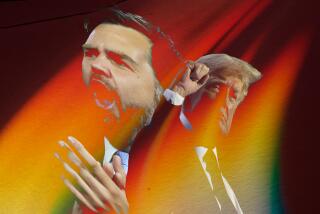Dr. Strangebudget or: How I learned to stop worrying and love the fiscal cliff
Not to sound Panglossian, but all things considered, this whole “fiscal cliff” exercise hasn’t been such a bad thing.
I’m not saying it’s been good for the economy or the public’s faith in government. It’s had the opposite effect, and things may get considerably worse on both fronts before the episode is done.
I’m just saying it’s been a less disruptive fight than the previous go-arounds -- or, potentially, the one to come.
The underlying problem is a deep ideological split between Democrats and Republicans over the size and role of the federal government. That disagreement makes even routine tax and spending measures, such as the annual appropriations bills and the yearly renewal of popular temporary tax breaks, excruciating. Unless there’s a deadline and real consequences for missing it, deals just don’t get cut.
Beyond that, the magnitude of the split makes it well-nigh impossible for Congress to do significant, conclusive deals. Instead, it’s been passing stopgap measures while imposing new deadlines, often with higher stakes.
The so-called fiscal cliff was created that way. Unable to settle the fate of the Bush-era tax cuts in 2010, lawmakers and President Obama punted the issue to the end of 2012. Incapable of striking a deficit-reduction deal in 2011, they teed up across-the-board spending cuts for 2013 and beyond that neither side wanted to go into effect.
Now that those tax cuts are about to expire and the spending reductions are about to go into effect, Republicans and Democrats are having another rock ‘em sock ‘em fight over bedrock budgetary issues. But the good thing is that the stakes are, finally, the right stakes.
Previous budget battles in this Congress have threatened either to shut down the government (by failing to provide funding for discretionary programs) or withhold payments from some or all of the United States’ creditors (by barring the Treasury from borrowing the money needed to pay the tab Congress had already rung up). Shuttering federal agencies and services is close to the ultimate expression of legislative dysfunction, surpassed only by stiffing contractors, beneficiaries and bondholders. These are the sorts of things that failed states do. And the current Congress came close to doing both in 2011 and 2012.
Why? Because “tea party”-infused Republicans have been desperate to trim the deficit by cutting spending but not raising taxes. Hoping to overcome opposition from Democrats, the GOP has taken key pieces of legislation hostage. First it was omnibus appropriations bills, which meant threatening to shut down government agencies and services. Then it was the bill to increase the debt limit. The brinkmanship on the debt limit so rattled Standard & Poor’s, it downgraded the U.S. credit rating for the first time in history.
Unlike the previous rounds, the current exercise in brinkmanship doesn’t involve lawmakers refusing to fulfill the basic ministerial obligations of their office. It’s not about keeping the lights on or paying bills. It’s about what kind of medicine to apply to the government’s unsustainable deficits.
If lawmakers can’t reach an agreement, the medicine will be quite harsh -- in fact, Federal Reserve Chairman Ben Bernanke has warned that the combination of tax increases and spending cuts could throw the country briefly into recession again. But as the Congressional Budget Office has noted, those steps would also have a salutary effect on Washington’s fiscal woes.
Ideally, Congress and Obama would agree to a plan that would bring the federal deficit under control without tanking the economy in the short term. But failing that, it’s hard to begrudge either side for its unwillingness to accept what strikes them as a bad deal that would do little more than punt the fiscal problems to another day.
The questions of tax rates and spending levels are truly consequential, and it’s worth having a big fight over them. The protracted fight has been a drag on the economy, true, but there was no chance of a quick or easy deal in the current political environment. And with members on both sides believing they’d have more leverage after the tax hikes and spending cuts went into effect, it would be a small miracle if there were a last-minute deal of any consequence.
If the fight does drag on into the new year, though, the terms could change for the worse. The Treasury Department has declared that Washington has hit its borrowing limit again, and so the government will need to raise the debt ceiling within a few months to avoid defaulting. Chances are good that Republicans will shift the fight over taxes and spending to the debt-limit bill, setting a stage for a repeat of the wrangling in 2011 that damaged the country’s credit rating.
Should Congress keep threatening to default, buyers of Treasury bonds will eventually start taking the threat seriously, driving up interest rates for everyone and exacerbating the fiscal problems Republicans are so eager to solve. Should that happen, people may find themselves wishing for the day when the biggest threat was Congress sliding over the fiscal cliff.
ALSO:
Venture capital didn’t build that
Hey, kids, don’t forget your guns
2012 endings: What we won’t miss at all
Follow Jon Healey on Twitter @jcahealey
More to Read
A cure for the common opinion
Get thought-provoking perspectives with our weekly newsletter.
You may occasionally receive promotional content from the Los Angeles Times.











